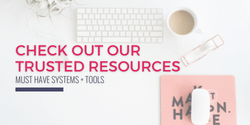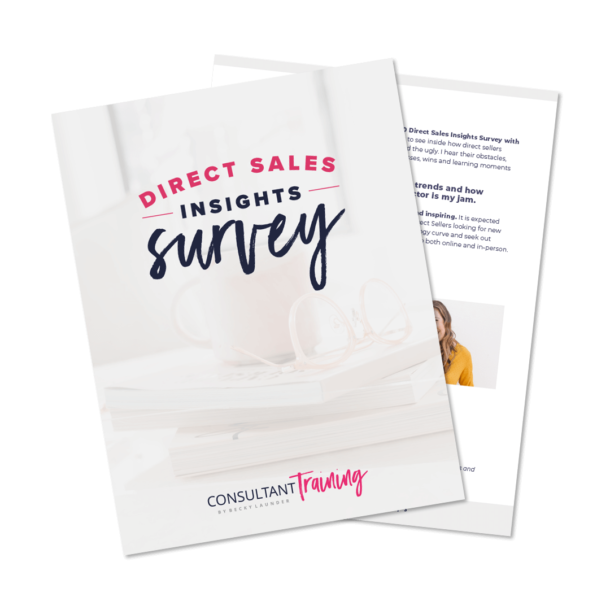We all want someone who can come into our lives and help us focus on what matters, which is why today, we asked productivity coach Chelsey Newmyer to join us on the Modern Direct Seller Podcast! A self-proclaimed time-management nerd, Chelsey is all about personalizing a plan that will help support not the high-level executives with teams of people behind them, but the direct sellers and employees who have to manage their businesses and their busy homes. Listen in as she breaks down common productivity problems and her best solutions to overcome them, from utilizing micro-moments in your day to making tough tasks more manageable, so you can feel less overwhelmed and more prepared to make your time work for you!
Find Chelsey on her website, check out her podcast, or connect with her on Instagram!
Time based notes:
- 1:37 Chelsey Newmyer introduction
- 5:18 Procrastination hacks
- 10:22 Productivity in micro-moments
- 13:15 Minimizing distractions
- 15:29 Focusing on true priorities
- 20:22 Chelsey’s favorite office supply
- 21:41 “Raise to wake” phone feature
Plan for Productivity with Coach Chelsey Newmyer
This week on the Modern Direct Seller Podcast, we were joined by podcast host and productivity coach Chelsey Newmyer! She shared the common productivity problems that she sees, as well as her best solutions to overcome them, from utilizing micro-moments in your day to making tough tasks more manageable, so you can feel less overwhelmed and more prepared to make your time work for you.
Before we dive into the secrets on how to become more productive in business and life and focus on those things that matter the most, tell us a little bit about yourself. What is your background? And, how did you end up stepping into this title of productivity coach?
So, I have always been a time management and productivity nerd. I’ve always been that person who had the fresh notebook, and used the planner that they gave us in middle school with the scratchy cover. I loved it. And, when I got into biomedical engineering in college, I was just slammed with schoolwork, plus I’m a total type-A person who was involved in, like, every single club I possibly could be. And so, I realized how important it really was to balance everything I had going in my life. But, it wasn’t until I got into the workplace that I realized that time-management wasn’t intuitive for everyone. It wasn’t something that was explicitly taught. I was always that kind of go-to person in the office to say, “Oh, you know, this is taking me a really long time. Can you help me figure out this Excel hack,” or “this email hack,” or anything like that. In addition, I started to tutor high school students who really struggled with executive function skills—so time management, productivity, how to plan projects, how to read textbooks.
But, it wasn’t until the pandemic hit and I wasn’t commuting anymore that I finally had actually some free time, and that gave me the space I needed to launch this business and realize how important it was to work with people to create personalized productivity. Because, the other piece of that is that every time you Google “how to work fast” or “how to stop procrastinating,” all the books feel like they’re written by people who are in these high-level executive spaces, who have people who are supporting them in the back end, right? You don’t read a lot of books about how to manage your work and your home and your business.
Kind of the last straw for me was, I was reading a book written by some executive at some high-level company, and he talked about taking a nap in the middle of the day. And, at the time, I was working in a traditional 9:00 to 5:00. I had to go in. So, I was like, “Great. Tell my boss, I need a couch in my office.” Like, that’s insane. I had to be available. It just wasn’t practical. And so, I wanted to be able to work with individuals, teach them the skills they need to create a schedule that makes sense for them, that’s not copy-pasted, and that teaches them the skills to adjust when things come up—because things happen, right? And, we’ve got to know how to tweak it, even with a perfect schedule.
So, I know many of us procrastinate in some areas of our life. What are those different forms of procrastination? And then, can we can unpack why we’re procrastinating, and some hacks to get around that?
Absolutely. So, this is one of my favorite topics, because it really boils down to the meat and potatoes of getting our work done. Because, we can have a beautiful schedule. We can have a great to-do list. But, if we spend the whole time procrastinating instead of actually accomplishing anything, we’re right back where we started.
There are two main reasons I see people procrastinating. The first one is, they have an abstract goal. What I mean by that is, they don’t understand exactly what that final thing is going to look like, and so they don’t know where to start. For example, let’s say you want to start a podcast. That is a big project; there’s a lot of moving pieces, with maybe a lot of things that you don’t understand, or don’t know where to get resources for. And so, all of that is going to stop you, because you’re just not quite sure where to put your foot to get that first step happening.
The other big thing I see, especially in business owners and direct marketers, is fear of failure and perfectionism. So, we’re really looking at all of the things that could go wrong when we put ourselves out in the world—and we have to be forward-facing. We have to put ourselves out there. But, we’re afraid of repercussions. We’re afraid of embarrassing ourselves. We’re nervous about the comments. We think that if we just tweak that Instagram post a little bit more, it’ll be perfect. Or, if we just wait a little bit longer, that thing we’re launching is going to be ready. And, the reality is, we have to take that messy action.
So, there’s a few other reasons we procrastinate. Obviously, if you don’t like the task, if you really need that deadline pressure, those can all impact it as well. But, what I see most commonly is that abstract goal, and that fear of failure, perfectionism, really slowing us down.
Okay, so let’s talk about those goals, right? Those priorities, and maybe the tasks that we don’t like so much. Because, I’ve seen that sometimes we’re not prioritizing the things that are actually going to make a difference in our business. It’s easy to prioritize the easy stuff to check off the list, or the things that are within our comfort zone that we’re confident doing. But oftentimes, what really moves the needle in the business is the stuff that we don’t prioritize, or we don’t give as much love and attention to as we probably should. So, what are your tips around focusing on the right things? And, when everything feels like a priority, or our to-do list is 100 items long, how do we focus on those things that are going to make a big difference in our businesses?
So, I define “priority” as something that’s going to move you towards your goal—which means that we have to also understand what our goal is. Generally speaking, that is making money, right? So, what moves are you going to make to make money that week, that day, that month?
So, instead of looking at our to-do list and saying, “Ooh, this is way more fun. I don’t know if I want to do this. I want to do that,” we want to make the decision the night before, so we’re not as swayed by our emotions or our inclinations. We also want to be thoughtful about when we’re working on things. If you’re more focused in the morning, then maybe that’s when you want to do some of those harder things and just kind of get them out of the way. I’m much more focused in the afternoon. So, I like to prioritize conversations in the morning and meetings in the morning, and then really do my focused work in the afternoons. Even if you don’t want to do it, it’s gonna be done faster if you put it at the right time of day.
And, if you need a runway, if you need that momentum, then set a timer for 20 minutes, 30 minutes, do the thing you want to do, and then, when that timer hits, roll into the hard stuff, into that thing that you know is important, but you don’t necessarily love or want to do it. Sometimes I need a runaway, too. And so, I’ll work on a couple easier tasks that are fun for me, build up that momentum, get into work mode, and say, “Okay, now I’m ready to go. Now, I’m going to tackle that bigger project.”
And, we should also be breaking those big projects down into their smallest possible pieces so that they don’t feel so overwhelming. Piece them out. Put the smallest steps on the to-do list. Give yourself things that have a definitive beginning and end, that take maximum an hour, just so you’re seeing that daily progress. Maybe you’ll get more done. That’s fantastic. You can always go back and add more. But, we want to feel accomplished at the end of the day.
For example, let’s say you need to follow up with your customers, and you have 10 customers. The task is “follow up with customers,” but I’ll make 10 little boxes next to that task, because then it becomes 10 little micro-tasks that I can cross off every time I do it. And, those are also opportunities to create a template, so that you’re just personalizing it to each person, and you’re reducing the friction to get started.
So, we first shared all of this advice on the Modern Direct Seller Podcast, so many listening would have been on their way to their full-time job, or folding laundry, or taking care of kiddos at the same time. We are pros at fitting business into the nooks and crannies of our day, and having really limited time to actually focus and get that work done. So, any tips to be productive when we have that time to sit down to actually work?
I love this question, because I think it’s so important to recognize that we are trying to fit a lot of things into these little micro-moments in our day, right? And, we can be really productive during those times—or just really intentional. So, when we have those nice chunks of time, you want to go into it having it planned ahead of time. I mentioned not letting our priorities get swayed by our emotions; I always plan my day the night before. I know exactly what I’m going to do, I know what order I’m going to do it in, because I don’t want to waste those critical 5 or 10 minutes during the beginning of a 2-hour block, let’s say, figuring out what I’m going to do, or kind of poking around in my inbox, or shuffling papers, right? I want to sit down and get right to work. And again, that to-do list has super actionable steps. So, it doesn’t say, “Start a podcast.” It says, “Set up posting platform account,” right? Like, again, really simple, actionable things to do.
Thinking back to those smaller moments that we have, I really like to keep a running list of tasks that are going to take less than 15 minutes. And, if I get lucky and a meeting ends early, instead of feeling like I have to jump into a bigger project, I can just take care of one or two of those small tasks. So, I keep that momentum going, but without feeling like I might have to start and stop a bunch of projects.
And, the other is to recognize that often things take less time than we anticipate. When you’re mapping out your day, I like to set tasks up in sprints. I’ll say, “Okay, this is my 15-minute sprint. What can I get done in 15 minutes?” And, often I get whatever-that-thing-is done much faster, because work expands to fill the time it’s given. If you give yourself 2 hours to do something, it’s going to take you all 2 hours. If you give yourself 2 weeks to do something, it’s going to take you 2 weeks. But, if you give yourself 15 minutes, you’ll be pretty amazed by how much you actually get done in that time, if you’re really focused.
Minimizing distractions during that 15-minute sprint is probably also really important. Because, I think many of us are used to multitasking, which I know is not always a great productivity tip.
I actually like to set a timer on my phone. And then, if I instinctively go to reach for my phone, I see the timer going, and it makes me pause. I’m like, “Oh, yeah, that’s right. I’m not supposed to be touching my phone right now.” As much as you can do to get rid of those distractions, I would highly recommend. Close out your email. And, if you work in an office space where you feel like you have to have your email more available, then that’s a great opportunity to have a conversation with your team and decide, “What is the communication hierarchy,” right? Like, what is the expected response time for an email versus a Slack notification versus a text message versus a phone call, right? Like, “I don’t want a phone call unless something’s on fire. Otherwise, it’s an email that I will get back to in 24 hours.” That’s a really great opportunity to have a conversation with your team about the expectations, so that you’re confident and comfortable closing out some of those distractions.
You shared an amazing tip that I had never heard of when we had our Masterclass together. Tell us about when you pick up your phone and it doesn’t automatically turn on.
So, if you have an iPhone, there’s a feature called “Raise to Wake.” And, when you touch your phone without this feature turned off, the default setting is that the screen lights up. So, it’s gonna light up, and it’s gonna show you all the notifications that you have on your homepage. When “Raise to Wake” is turned off, however, the screen doesn’t light up until you touch it, until you interact with the screen itself. And, it’s the simplest little change, but someone recommended it to me, and it drastically decreased the amount of phone time I have without even me noticing.
It’s those simple things. With technology, it’s great that we have everything at our fingertips on our phone, but there’s all of these hacks that we have to create to make sure that it’s not just completely taking over our life—which I’m sure many can also relate to. We’re constantly checking for notifications, checking for orders, checking for social media posts, whatever it might be, and so it’s easy to get distracted. And then, 20 minutes later, you’re like, “I’m still on my phone scrolling, and I don’t even know for what.”
And, as much as I can utilize those settings, I do, because I never want to have to rely on my own willpower to avoid those distractions. I need my willpower for other stuff. So, set yourself up for success using some of those settings and tricks.
Get more leads, customers, and teammates—in just five days—by joining us for the Modern Direct Seller Challenge!
Take Action: What is one way that you can make tasks more manageable in your business?









0 Comments